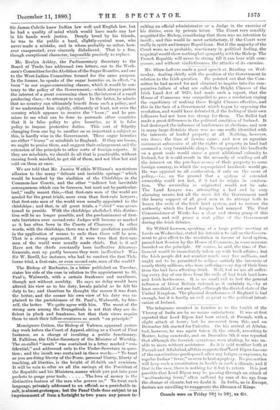Mr. Shaw-Lefevre made a good speech at Reading on Wed-
nesday, dealing chiefly with the position of the Government in relation to the Irish question. He pointed out that the Com- mittee he had moved for and obtained to inquire into the com- parative failure of what are called the Bright Clauses of the Irish Land Act of 1870, had made such a report, that the House of Commons was compelled to pass a resolution urging the expediency of making these Bright Clauses effective, and this in the face of a Government which began by opposing the resolution, and would have defeated it, if the feeling of their own followers had not been too strong for them. The Ballot had made a great difference in the political condition of Ireland. It had destroyed the influence of landowners at elections, and now in many large districts there was no one really identified with the interests of landed property at all. Nothing, however, was done ; the time of famine came ; and now an agrarian movement subversive of all the rights of property in land had assumed a very formidable shape. To expropriate the landlords on a great scale would cause a great additional calamity to Ireland, for it would result in the necessity of sending out all the interest on the purchase-money of their property to some foreign country, to which the expropriated landlords would go. He was opposed to all confiscation, if only on the score of policy,—i.e., on the ground that a system of extended ownership could not last, if it had its origin in confisca- tion. The ownership so originated would not be safe. The Land League was attempting a bad end by very alarming means, but all the more did the Government need the hearty support of all good men in its attempt both to lessen the evils of the Irish land system, and to restore the authority which the Land League had usurped. The First Commissioner of Works has a clear and strong grasp of this question, and will prove a real pillar of the Government during the Irish debates.






































 Previous page
Previous page